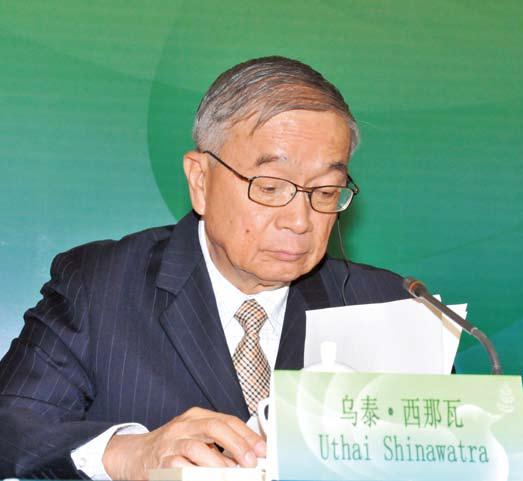Speeches at the Sub-Forum by Uthai Shinawatra, Vice President of Thai-Chinese Culture and Economy Association

Uthai Shinawatra
Vice President of Thai-Chinese Culture and
Economy Association
Chairman of the Advisory Board of the Thai-Chinese Culture and Economy Association,
Ladies and Gentlemen,
First of all, on behalf of the Thai delegation, I would like to thank the China Foundation for Peace and Development for inviting us to participate in this forum. We are honored to have this opportunity to have discussions with delegations from other countries on the important topic of “Peace and Development.” The Thai delegation greatly appreciates the efforts of the Chinese government and the China Foundation for Peace and Development to make “Peace and Development” the main objective of the forum for the fourth year in a row. Persistently holding forums of seeking regional peace and development illustrates the Chinese government’s determination and sincerity towards safeguarding regional peace and development.
Ladies and Gentlemen,
Southeast Asia is home to a population of 600 million and has been the center of world food production for a relatively long time. Given that it covers 70% of the world’s sea routes and 70% of maritime transportation, Southeast Asia is also a globally strategic maritime area that is of crucial importance to the international community and global economic development. Southeast Asian countries share similar cultures and have co-existed in peace for a long time. However, the fruits of Southeast Asia’s development and prosperity are often stolen and controlled by countries from outside the region, which leads to conflicts between countries within the region. Safeguarding the freedom and independence of the region and resisting interference by foreign forces is an important task facing Southeast Asian nations. I am committed to using peaceful means and the principle of seeking direct participation of countries involved in order to settle regional problems.
The disputes over the South China Sea might lead to regional conflicts conflict. The parties involved should uphold the principle of acting independently and settle problems through peaceful negotiations among directly affected nations. Other methods will only exacerbate the tension, damage the interests of the countries concerned and threaten regional security. In order to safeguard regional security and promote development, Thailand has already made a commitment to supporting the settlement of disputes among concerned parties through peaceful negotiations and opposing the intervention of the third party and the use of any forms of violent force.
Ladies and Gentlemen,
Countries in Southeast Asia are relatively small with Indonesia being the largest country in the region. In the region, every country has its own language and its own currency. At present we do not have a common currency or language, which, in a long run, is undoubtedly a disadvantage to trade. So in the next three years every country needs to adopt a variety of means to remove obstacles to achieve liberal development within the Asian community, and every country in Southeast Asia should promote trade and investment on the basis of their common regional history and strategic situation.
The Thai-Chinese Culture and Economy Association has developed guidelines aiming at promoting cooperation in three important areas among Southeast Asian countries and between Southeast Asian countries and China:
First, to support Mandarin Chinese being used as a second language on equal footing with English, and to promote its use in trade and investment in the region as well as trade with China. The use of this Asian language by Southeast Asian countries will undoubtedly be a source of pride for us.
Second, to promote the use of the Chinese RMB as the main currency in trade among Southeast Asian countries and between Southeast Asian countries and China, thus reducing the inconveniences to economic and trade exchanges caused by different currencies; to stabilize the financial markets and exchange rates among countries in the region by promoting capital and money market cooperation, and thereby meet the growing demand of investment and tourism markets.
Third, to promote maritime, air and land transportation cooperation among Southeast Asian countries and between Southeast Asian countries and China; to promote the establishment of land and sea transportation routes passing through Singapore and Malaysia that will bring prosperity to China and Thailand; and to promote the development of transit routes that link up the Pacific and Indian oceans so that the region can supply goods to the world with the shortest time and highest efficiency at the lowest price.
The most important transit routes are undoubtedly those from China to Southeast Asia. They are the channels linking Southeast Asia with the Chinese mainland, from which there is direct access to Europe. The exchanges among Eurasian countries will bring sustainable cultural prosperity which benefits everybody, not just the elites. If such trend goes on, the entire region will usher in prosperity and stability. Every country has the awareness to safeguard their dignity and the ability to resist interference by foreign forces.
Ladies and Gentlemen,
Cooperation between Southeast Asian countries and China is of great significance to safeguard regional security and stability as well as resolve regional disputes. This is the key to embrace peace in the region. Trade, tourism and cultural development are also important to all the countries in Southeast Asia, and will undoubtedly help promote world peace and development.
I hope we can have discussions in order to create a peaceful, developed, prosperous and stable Southeast Asia for the region and the world. I firmly believe we will achieve this goal.
Let us put aside our differences and work together to overcome all difficulties and create a new prospect of peace and stability and sustainable development.
